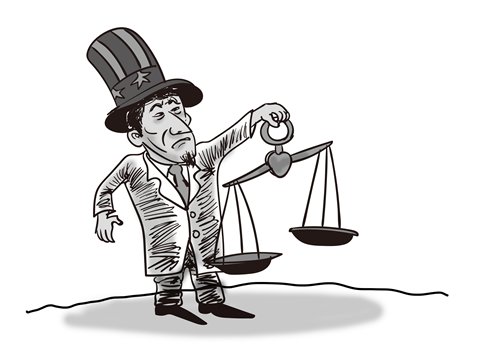
(Illustration: Luo Xuan/GT)
The New York Times declared in an article Tuesday that Facebook gave some of the world's technology giants "more intrusive access to users' personal data" for years. In turn, Facebook used contact lists from the partners, including China's Huawei, it said. The article also said that Huawei "has been flagged as a security threat by American intelligence officials."
This is one of Washington's continuous acts trying to force Huawei out, which indicates fiercer China-US high-tech competition. Whoever can invest more and attract more qualified scientists and technicians will outrun the other. Talent, which can be attracted by high wages and an open environment, is the crucial factor behind the US edge in high technology.
But it seems the US hasn't been performing well. According to a report of the University of California at Santa Cruz, nine in 10 workers in Silicon Valley make less now than they did in 1997 after adjusting for inflation. Without incentives, there is undoubtedly no motivation for technological innovation. The future of the US high-tech industry is in doubt.
In 2017, Huawei surpassed Ericsson to become the largest telecommunications equipment company worldwide. Now the US is forcing Huawei out of the game and its political intention is to force US enterprises to "decouple" from Huawei. High-tech decoupling is part of Washington's broad strategy to contain China's development and prevent its global dominance from being challenged. From Meng Wanzhou's arrest to the alleged sharing of personal data with Facebook, Washington is now comprehensively stifling Beijing's rise up the global industrial chain.
An article in the New York Times titled "Can the U.S. Stop China From Controlling the Next Internet Age?" exposed the US intention of suppressing China's 5G development: "The (US) government has a lot to be concerned about. As critical 5G… roll out over the world, many are being deployed by Huawei."
"And the idea of China… dominating that age is troubling," it said.
But the idea of technology decoupling is na?ve in the globalization era. Is China's high technology as vulnerable as the US wants to believe? Washington's acts precisely show that after 40 years of reform and opening-up, China's technology is reaching global competitiveness.
Talent is the foundation of a country's competitiveness in innovation. While Silicon Valley's incentives are lackluster, China must increase its investment in high technology and roll out more policies to lure qualified personnel. If China uses its domestic capital and technology effectively, it can create a more open environment to attract worldwide talent. We believe the talented will see the rising potential of Chinese technology.
In the long run, by deepening reform and opening-up and attracting talent, China can compete and counter this attempted decoupling. Chinese President Xi Jinping on Tuesday delivered a speech at a gathering celebrating the 40th anniversary of reform and opening-up, emphasizing that China will carry the policy through to the end. As capital, talent and technology flow worldwide, China's technological exchanges with other countries are reciprocal. Stifling Huawei, Washington will only get itself stuck in the mud.


